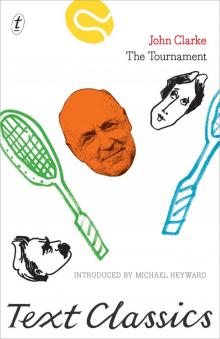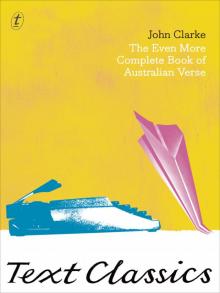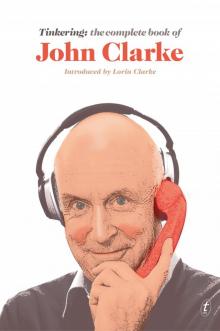- Home
- John Clarke
The Tournament
The Tournament Read online
About the Book
The streets of Paris are full of celebrities and media, and out at the stadium the crowds are already huge as players pound the practice courts in preparation for the greatest tournament of the modern era…From all corners they’ve come, the stars of the modern game. What a line-up!
The most unusual tennis tournament in history is about to start. Einstein’s seeded fourth. Chaplin, Freud and van Gogh are also in the top rankings. World number one is Tony Chekhov. In all, 128 of the world’s most creative players—everyone from Louis Armstrong to George Orwell, Gertrude Stein to Coco Chanel—are going to fight it out until the exhilarating final on centre court. First published in 2002, John Clarke’s The Tournament is a brilliant, bizarre comic novel. This new Text Classics edition features an introduction by Michael Heyward.
CONTENTS
Cover
About the Book
INTRODUCTION
The Crazy Games of John Clarke by Michael Heyward
Dedication
The Tournament
Preliminaries
Day 1
Round 1
Day 2
Day 3
Day 4
Day 5
Day 6
Day 7
Day 8
Day 9
Day 10
Day 11
Day 12
Day 13
Round 2
Day 14
Day 15
Day 16
Day 17
Day 18
Day 19
Day 20
Round 3
Day 21
Day 22
Day 23
Round 4
Day 24
Day 25
Day 26
Day 27
Round 5
Day 28
Day 29
Day 30
Quarter-finals
Day 31
Day 32
Day 33
Semi-finals
Day 34
Day 35
Finals
Day 36
Results
About John Clarke
About Michael Heyward
Also by John Clarke
Text Classics List
Copyright
The Crazy Games of John Clarke by Michael Heyward
THE TOURNAMENT is one of the oddest and funniest books ever published in Australia. It’s like Afferbeck Lauder’s Let Stalk Strine, or the poems of Ern Malley: we could never have predicted its existence, but it allows us to see and hear ourselves differently. John’s early drafts made it plain that he was doing much more than imagine the great minds of the century playing each other at tennis. That would have been peculiar enough, but it would also have been merely amusing, a charming gesture.
The book John was writing was more alarming by far. He had invented an entire tournament involving hundreds of twentieth-century writers, artists, thinkers, painters, musicians and agitators of all kinds, both men and women, with seedings and rounds and form guides and injuries, singles and doubles, including the mixed. Every result was to be recorded. He had dreamed up every last lob, smash and forehand winner. It was fantastic, irreproachable, deranged. A mind like that is not answerable to anyone. Of course, Text was going to publish this book.
John Clarke had been in training to write The Tournament his whole life. He was curious about everything. He loved ideas. He was extraordinarily sensitive to language and to effects of style. He was a brilliant mimic and parodist. He had the nerveless approach of the encyclopaedist. And he adored the idiom of sports commentary. Its cadences and phrasemaking can be heard in all his work. As a young man one of his party tricks was to imitate the legendary New Zealand race caller Peter Kelly. The best effects were apparently obtained by yelling into an empty beer jug. His alter ego, Fred Dagg, who had an opinion about everything, was famous for calling a flea race and was an expert on many sports, including ‘the ancient and revered art of tennis’. Fred explained that it is ‘time-consuming to a point where you can actually think you’re busy, it’s tiring, it involves special clothing and equipment and in general terms it’s a 100 per cent bona fide waste of time’.
A decade or so later Clarke invented farnarkeling, a mythic sport with its own rules, equipment, playing fields and fans. We didn’t need farnarkeling either, but having been given it we couldn’t get along without it. We had a new word; a new holy grail, the ‘bevelled orb’; and a new national hero, Dave Sorensen. The most astonishing thing about farnarkeling is that its entire world, from the gonad to the warble to the umlaut, was conjured up in a few thousand words of laconic commentary, largely written for the television show The Gillies Report in the mid-1980s. Farnarkeling is now the Linear B of Australian history, the lost alphabet of our sporting supremacy.
Farnarkeling is funny because we recognise the voice but have no idea what is being described. It takes the clichés of commentary and transforms them into something rich and strange by making them unintelligible. What is familiar is the tone, the authority of the commentator who needs a shared language to give shape to the speechless passion of the fan. Every punter knows how much we depend on the commentator to understand but we also know how inadequate the commentator’s words are to the action itself and the complexity of our response to it:
As expected, the focus of the match was the tussle between the dangerously fit Wojek Conrad and the very remarkable Dave Sorenson. Conrad had got away from Sorenson several times early in the second warble and seemed poised to take command, but Sorenson, who had been on antibiotics to clear up a blockage in the Eustachian tubes that had caused him to surprise himself while sneezing, proceeded to take the initiative and turn on a display of arkeling that will linger in the memory. The crowning achievement was probably the Inverse Blither he performed while running backwards by reversing the position of his feet and by leaping both up and sideways as the gonad was intercepted and despatched at apparently different altitudes simultaneously. The wall he hit will be shifted before the second round of matches…
If farnarkeling was the essential precursor, The Tournament works by different rules. Instead of making the clichés of commentary indecipherable it makes them shine by applying them to the realm of aesthetic appreciation. It gives us a glimpse of how the true understanding of anything can never exclude its comic possibilities. ‘Beckett,’ Clarke tells us, ‘was nothing if not patient. He waited. In fact, waiting probably won him the match.’ Marie Stopes ‘has one of the best defensive games in the business’. Percy Grainger ‘didn’t mind being beaten’. Proust’s ‘obsession with keeping the ball in play’ leads ‘to longer and longer rallies which have weakened him to the point of collapse’. And here is Vincent van Gogh on the court:
Vangers is regarded by many as the best player never to win a grand slam tournament. Plagued by ear problems which have affected his balance and by balance troubles which have affected his ear, he has career prizemoney to date of nil. He began wildly, returning service by rocking back onto his right foot and belting the ball with astonishing power as high in the air as he could. If it came down on his own side of the net, he shouted at it and hit it again.
Tennis offered other formal opportunities. It allowed Clarke to talk about his players in pairs, so that he could use one to put the other into comic relief. Spare a thought for poor Beatrix Potter, drawn to play Ayn Rand:
The players shook hands. ‘Good luck, Ayn,’ said Potter.
‘Get out of my way,’ replied Rand, ‘or I’ll fucking kill you.’
Part of the weird luminous glow of this book is its affection for its hapless participants. Parody is the purest form of admiration. Albert Schweitzer was scheduled to play Maurits Escher in a second-roun
d match-up:
Schweitzer is no slouch and he didn’t do much wrong but at one stage he served to Escher’s backhand and Escher hit a beautiful forehand winner for 0–15. Schweitzer’s next serve was to Escher’s forehand. Escher hit a backhand winner of 0–30. Schweitzer served again, curving into the body. Escher somehow fended it back and Schweitzer hit a cross-court drive into the ad court and was passed by a shot coming back from the deuce court…‘I didn’t know where I was,’ said Schweitzer. ‘He was playing angles that weren’t there.’
Then there are the jokes on history. The Marxist philosopher Rosa Luxemburg, for instance, is drawn to play Leni Riefensthal. Clarke’s tournament does not take place in a political vacuum. The ‘Russian authorities,’ we learn, ‘want victories but are threatened by the players who achieve them.’ And ‘Nike president Friedrich Nietzsche has initiated legal proceedings against German organisers for attributing to him remarks expressing the idea that German players were supermen.’ A handful of players come to grief or disappear or are excluded from the tournament, and at least two are murdered. The survivors among John’s pantheon of writers and artists tend to be the non-conformists, the dissidents, those who diagnose oppression and resist tyranny.
When The Tournament was published, in 2002, John Clarke was in his early fifties. He was already the author of a dazzling book of poetic parodies, The Even More Complete Book of Australian Verse. He had been writing his signature political interviews for fifteen years. He had just finished The Games, which Barry Humphries described as ‘the funniest television program ever made in Australia, as well as the most brutally honest depiction of local bureaucracy’. He was, in other words, at the top of his own game.
The Tournament is a lunatic book that is deeply sane about the power and the limits of art. Its crazy games pay homage to freedom and the life of the mind. Like so much of John’s writing it reminds us that when something is both funny and true it sinks in.
First set, Mr Clarke to serve. Play!
The Tournament
for
Charlie Boy
Preliminaries
Day 1
* * *
Ibsen and Monet v. James and Twain
* * *
If the players in this city aren’t careful they’re going to be among the most famous people on earth. Paris has gone crazy. More people in the streets would be hard to imagine, and that’s not counting the celebrities, the journalists, the experts. Every hotel is booked out. There are flags and banners everywhere, every colour under the sun.
Out at the stadium the crowds are already huge as competitors pound the practice courts in preparation for the greatest tournament of the era. Organisers predict it will be the most successful event of its type ever staged. All tickets are sold, there’s not a single ground pass left, and the worldwide television audience is tipped to be in the billions.
They’ve opened three more runways at the airport where players and officials have been arriving like migrating birds. Make no mistake about it, this tournament is anyone’s and they’ve come from all corners, the stars of the modern game.
Some have arrived in teams, the Germans last night: Hermann Hesse, Brecht and Weill, Gropius, Carnap and the great Mann, Heidegger, Schweitzer, Ernst. What a line-up!
Reporters tried to get a few words as the players came through but they were hurried out a side door.
‘No interviews will be permitted,’ said a German official.
This morning the Austrians were less formal. Gustav Mahler introduced some of the team: Wittgenstein, Melanie Klein, Werfel, Kokoschka, Gödel and Klimt.
‘We’re looking forward to playing here,’ he announced.
‘Where is Freud?’ asked Tennis magazine’s Norman Mailer.
‘Arriving by train,’ said Mahler. ‘Tonight, I think.’
From America we have Ernie Hemingway, Fitzgerald, Crosby, Frankie Wright, Ray Chandler, Bix Beiderbecke and Louis Armstrong, Bessie Smith, Gertrude Stein, Isadora Duncan and Mary McCarthy. Amelia Earhart flew her single-seater from New York.
‘Great to be here,’ said Ernie. ‘The plane was high in the air. I slept and then I ate and drank and then I slept again. The sun came up. I drank again and then I slept. Then the plane banked and came in and landed and stopped and I could hear the great big engines being turned off. That’s the way it is.’
The South Americans have been training in Italy and turned up yesterday before anybody else: Borges, Rodo, Rivera and Kahlo, Neruda and Villa-Lobos.
The Swiss and the Dutch are here. Watch the Dutch. Their record is excellent and Escher and van Gogh are two of the strongest chances in the men’s competition.
The formidable Russian contingent came in over several days. They’re taking this seriously and have left nothing to chance: Rachmaninov, Stravinsky, Pavlova, Akhmatova, Eisenstein, Prokofiev, Shostakovich, Pasternak and Chagall, they’re all here. And, perhaps most importantly, Chekhov and the Count are in town.
The English hope for glory and are here in numbers. ‘The strongest team ever to cross the Channel,’ according to Frank ‘the Ferret’ Leavis who’ll be trying to get through the qualifiers. Lawrence, Waugh, Kipling and Maugham, Auden, Spender and Isherwood are here. Little Bertie Russell and Herbie Wells are here. Edith Sitwell, Dot Sayers, Virginia Stephen-Woolf and Vita Sackville-West are here. Orwell is expected any minute.
From Poland have come the great Nijinsky and Conrad, the gifted Rosa Luxemburg and the fabulous Paderewski. Nijinsky was ‘pleased to be back. I’ve always loved playing here. I feel good. Very fit. Watch this.’ And quite suddenly, wearing an overcoat and carrying three suitcases, he leapt five metres straight up in the air.
Beckett arrived on a bicycle, Joyce and Chaplin by car. Tallulah Bankhead came up the river on a barge. W. C. Fields arrived by dirigible. Buster Keaton was catapulted in from Belgium, Escher arrived through the departure lounge, Dali came by overnight post and Alice Toklas sent herself as an attachment. Einstein said he had come by tram.
‘But there is no tram to Paris,’ corrected George Plimpton from the Paris Review.
‘That might account for the time lapse,’ Einstein explained.
And from all over France the French have arrived: Sartre, de Beauvoir, Camus, the considerable Proust, Braque, Derain, Seurat, Debussy, Bernhardt, Cocteau, Satie, Duchamp. What depth there is in the French game! And what will they do in front of their own crowds?
‘Where is Picasso?’ asked Roland Barthes from Paris-Match. ‘And where is SuperTom?’
But the Spanish champion delayed his arrival at the stadium until late afternoon. Pablo Picasso stepped out of an open sports car to a rapturous reception at 5.55 pm, just in time to make the evening news.
The London-based American SuperTom Eliot was more subtle, coming in under the radar late at night and staying with friends ‘to avoid any fuss’. His preparation is said to be ‘perfect, if he gets a decent draw’. Opinion seems to be that if he and
Picasso are in opposite halves of the draw we’ve got a real contest on our hands.
Oscar Wilde is in from London. ‘Couldn’t stay away,’ he said. ‘One should always attend events in which one has no possible interest. They are invariably the most rewarding.’
‘Are you serious?’
‘A gentleman should always be serious. It amuses one’s butler and fortifies the religious convictions of one’s mother.’
‘But an event which is of no interest cannot possibly be rewarding.’
‘That is a thesis refuted by its own expression. I’m happy to say that, properly used, the language is full of them.’
‘But surely if language has meaning, it is because each individual word has meaning. A word that means nothing is useless.’
‘Everything contains its own opposite. That is its strength. Nothing is itself alone. That is its.’
Live television and internet coverage of this astounding event began with an exhibition doubles match featuring Henrik Ibsen and Claude Monet again
st Americans Henry James and Mark Twain. The big-hearted Norwegian and the French institution were given a hero’s welcome as they came out on Centre Court and memories flooded back as they slipped into their old rhythm. James played a perfectly timed lob at one stage and Ibsen lost sight of the ball. Monet moved away down the service line, keeping the ball over his left shoulder, and prepared to manufacture any kind of a shot to keep the ball in play. At the last minute, going left to give himself room, he hit a backhand cross-court drive which dropped just over the net.
‘I thought it was a forehand down the line,’ said Twain later. ‘It looked like a forehand down the line.’
‘Was it not a forehand down the line?’ said James. ‘My clear recollection is that it was a forehand down the line.’
‘We are doomed,’ said Ibsen.
‘It was supposed to look like a forehand down the line,’ said Monet.
‘It did,’ said Twain. ‘How do you do that? That’s brilliant.’
‘I try to make it look as if it feels as if it’s a forehand down the line,’ said Monet.
‘Try not to be absurd,’ said James. ‘Nobody of any importance is persuaded by what something looks as if it feels like.’
‘Are you kidding, Henry?’ said his partner. ‘Why didn’t we get it back?’
Ever the showman, Twain pulled out an armoury of trick shots and on several occasions all Monet and Ibsen could do was stand and applaud. Playing in bare feet because there was a frog asleep in one of his shoes, Twain hit the ball through his legs, around his back and from as far as three rows back in the stand.
‘He’s completely ridiculous to play against,’ said Ibsen. ‘He drives you crazy. I spoke to him about it at one stage and he called an official over and told him I didn’t have a ticket and he’d never seen me before in his life.’
‘You need to keep these old guys on their toes,’ said Twain, ‘or they’ll seize up altogether. I promised Ibbo’s wife I’d run him around a bit.’

 The Tournament
The Tournament The Even More Complete Book of Australian Verse
The Even More Complete Book of Australian Verse Tinkering
Tinkering